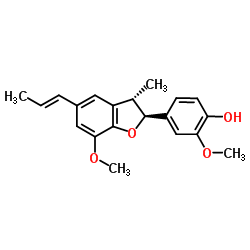Licarin A
Modify Date: 2024-01-05 07:22:14

Licarin A structure
|
Common Name | Licarin A | ||
|---|---|---|---|---|
| CAS Number | 51020-86-1 | Molecular Weight | 326.386 | |
| Density | 1.2±0.1 g/cm3 | Boiling Point | 452.0±45.0 °C at 760 mmHg | |
| Molecular Formula | C20H22O4 | Melting Point | N/A | |
| MSDS | N/A | Flash Point | 227.2±28.7 °C | |
Use of Licarin ALicarin A ((+)-Licarin A), a neolignan isolated from various plants, significantly and dose-dependently reduces TNF-α production (IC50=12.6±0.3 μM) in dinitrophenyl-human serum albumin (DNP-HSA)-stimulated RBL-2H3 cells. Anti-allergic effects. Licarin A reduces TNF-α and PGD2 production, and COX-2 expression[1]。 |
| Name | Licarin A |
|---|---|
| Synonym | More Synonyms |
| Description | Licarin A ((+)-Licarin A), a neolignan isolated from various plants, significantly and dose-dependently reduces TNF-α production (IC50=12.6±0.3 μM) in dinitrophenyl-human serum albumin (DNP-HSA)-stimulated RBL-2H3 cells. Anti-allergic effects. Licarin A reduces TNF-α and PGD2 production, and COX-2 expression[1]。 |
|---|---|
| Related Catalog | |
| In Vitro | Licarin A is found in plants such as Aristolochia taliscana, Machilus thunbergii and Myristica fragrans, which are used as spices and in folk medicines for nervous and digestive disorders. Licarin A also exhibits anti-inflammatory effects[1]. Licarin A (5-20 μM) reduces TNF-α and prostaglandin D2 (PGD2) secretion via the inhibition of PKCα/βII and p38 MAPK pathways. Licarin A treatment tends to reduce phosphorylated PKCα/βII and p38 MAPK protein levels[1]. |
| References |
| Density | 1.2±0.1 g/cm3 |
|---|---|
| Boiling Point | 452.0±45.0 °C at 760 mmHg |
| Molecular Formula | C20H22O4 |
| Molecular Weight | 326.386 |
| Flash Point | 227.2±28.7 °C |
| Exact Mass | 326.151794 |
| PSA | 47.92000 |
| LogP | 4.19 |
| Vapour Pressure | 0.0±1.1 mmHg at 25°C |
| Index of Refraction | 1.596 |
| Hazard Codes | Xi |
|---|
| 2-Methoxy-4-{(2S,3S)-7-methoxy-3-methyl-5-[(1E)-1-propen-1-yl]-2,3-dihydro-1-benzofuran-2-yl}phenol |
| Phenol, 4-[(2S,3S)-2,3-dihydro-7-methoxy-3-methyl-5-[(1E)-1-propen-1-yl]-2-benzofuranyl]-2-methoxy- |
| Licarin A |
| dehydrodiisoeugenol |